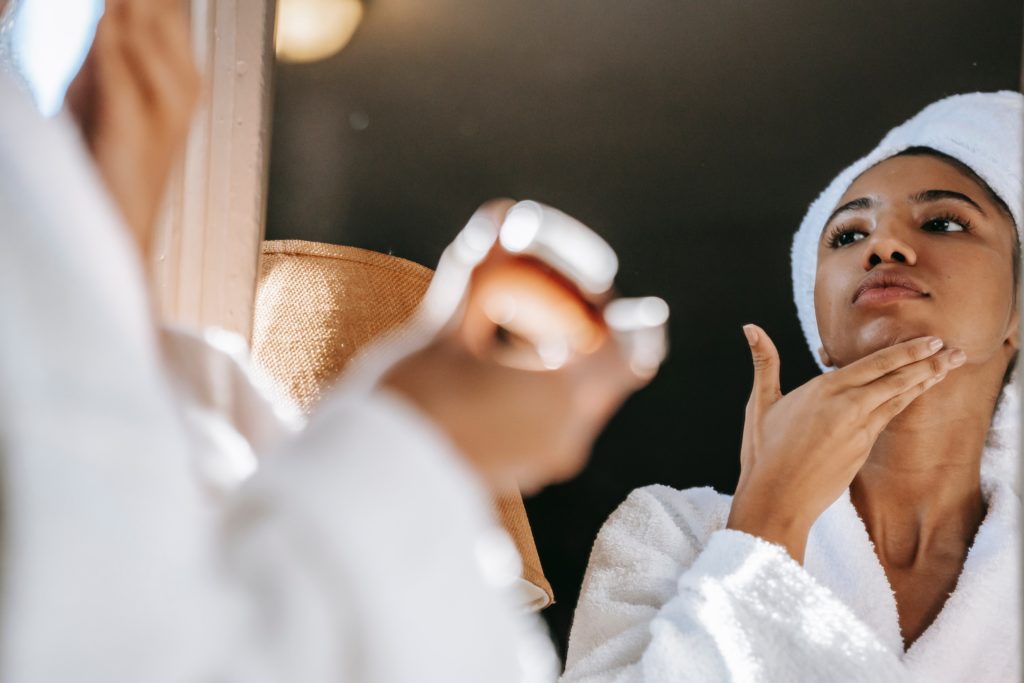Skin – the largest organ in the human body.
And arguably, the one that absorbs some of the most damage. That’s why it’s so important to keep it looking and feeling healthy as we age.
Here, we’ll explore how you can maintain a healthy adult skincare regimen – beginning in your 20s up through your mature years.
Skincare in Your 20s and 30s
When we’re young, we may feel that we’re invulnerable to things that can affect how our skin looks and feels. But the truth is, what we do at this age can impact our skin for years to come. Start building good habits early to keep your skin healthy and prevent damage as you age. Here are some tips.
- Protect your skin from the sun
Sun exposure (or any exposure to UVA/UVB light, whether from the sun or an artificial source) causes the majority of damage to the skin – everything from dryness and wrinkles to melanomas and other skin issues. And we all know how important it is to protect our skin, but it’s easy to forget to do it as we go about our daily lives.
So make sure you apply sunscreen when you spend time outdoors, even if it’s just a trip to the store. Many moisturizers today contain a built-in sunscreen, so applying it should be part of your daily routine.
- Eat a balanced diet
Remember when you were a teen, and your mom told you not to eat too much fried food or it’d make you break out? Well, even though the idea of greasy food causing acne is a myth, what you eat does play an important role in how your skin looks and feels.
To maintain healthy, supple skin, eat a diet rich in vitamins, healthy oils, and antioxidants – compounds that help protect your skin cells from the effects caused by the sun and other damage. It’s OK to take supplements, but they shouldn’t substitute for the majority of your nutritional intake.
And limit foods high in sugar and fats – the likely culprits behind those acne flare-ups (and poorer health overall).
- Drink plenty of water (and limit sugary or alcoholic beverages)
Stay hydrated by drinking lots of water, which will plump up your skin and minimize the appearance of pores, wrinkles, and other imperfections. And limit your intake of sugary beverages such as soda, along with alcoholic beverages (though a glass of wine at night is probably fine, and may even have health benefits).
- Genetics play a huge role
Our genes are a big factor in determining our skin health. If you have a history of skin cancer or other skin conditions in your family, It’s never too early to get checked out. This also applies to those familial skin trademarks passed down through generations, as it can change over time and turn into cancer.
According to Dr. Anthony Benedetto, dermatologist, you should detect and identify potential skin melanomas by using the ABCDE method:
A for Asymmetry
Watch for lesions or moles that change from a round shape to an asymmetrical shape.
B for Border
It should look sharp and delineated, not irregular or scalloped.
C for Color
If a typical brown or pink lesion has multiple colors, that’s very suspicious, even if it’s smaller.
D for Diameter
Look for anything larger than a 16th of an inch, or an eighth of an inch.
E for Evolving
If the lesion changes over time, it should be examined.
What about cosmetic procedures?
In our 20s and 30s, we have naturally full, symmetrical faces. This age group shouldn’t need procedures like Botox or fillers to improve skin’s appearance, unless you have a medical issue or spend a lot of time outdoors and have heavily sun damaged or wrinkled skin. (But if this is your thing, that’s OK too.)
Skincare in Your 40s, 50s, and Beyond
Once you’ve established good skincare habits in your youth, continue practicing them as you age. But also keep in mind that, regardless of the rigidity of your skincare routine, your skin will naturally change – elasticity decreases, muscle lines form from lots of use, and soft tissue gets pulled down, causing the shape of the face to change.
For those who want to preserve a more youthful appearance at this age, cosmetic procedures are more available now than ever before. Since the 2000s, the practice of dermatology has evolved to include cosmetic concerns like skin tightening/firming (Botox/fillers), fat removal (liposuction), and skin tightening (microdermabrasion, peels, and more).
For non-surgical options that help improve your skin’s appearance and slow the effects of aging, you can always try topical treatments like retinol or hyaluronic acid.
This article is based on Skincare Through the Years with Dr. Anthony Benedetto, an episode of FemmePharma’s Love Mia Vita podcast.
